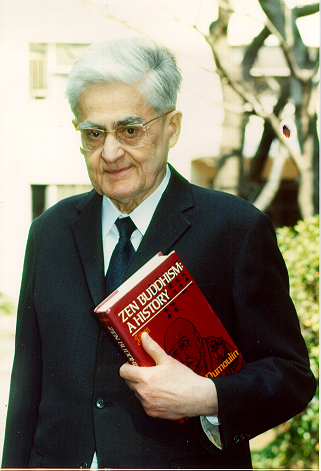Heinrich Dumoulin (1905–1995)

In Memoriam
On July 21, 1995, Heinrich Dumoulin, S.J., died quietly at age 90, after three weeks of hospitalization. He was led to his final resting place in a funeral service of monastic simplicity at St. Ignatius Church (Yotsuya, Tokyo) on July 25.
We of the Nanzan Institute for Religion and Culture wish to express our sorrow over his passing and pay him a final tribute. This, we are happy to say, is not the first tribute we offer him, since on the occasion of his eightieth birthday ten years ago we honored his scholarly achievements by dedicating the 1985 double number of the Japanese Journal of Religious Studies to him and his work. It is to this issue that we refer the reader for Father Dumoulin’s biography (pp. 109–115) and list of scholarly works (pp. 263–71).
The story of Father Dumoulin’s last ten years is eloquently told by the supplementary bibliography below. As the long list of publications shows, Father Dumoulin continued to work steadily at his scholarly projects—“making up for things left undone in my younger years,” as he himself put it—till the very end. What his work shows is that, despite a slower pace and two short-term hospitalizations, old age was unable to tame the scholar; what it does not tell us is that the accumulating years did not succeed in warping or souring the man. Father Dumoulin remained the same unassuming, serene, and gracious presence right to the end.
If Father Dumoulin was great as a scholar, he was greater still as a human being. If we respected him for his scholarship, we loved him for his human qualities: a man totally honest, self-disparaging, joyful, and always warmly welcoming and encouraging when you had the privilege of meeting him. A good look at his photograph, with his somewhat impish smile, will perhaps give a better idea of the man behind the scholar than our words ever can.
We of the Nanzan Institute owe Father Dumoulin a great debt, especially for the inspiring help he was in the establishment of the Institute (to the point of accepting the position of the Institute’s first director [1975–1976] despite his heavy responsibilities at Sophia University) and for the way he always stood right behind us as an enduring, reassuring, and ever encouraging “guardian angel.” As we have been increasingly realizing in the months since his passing, Father Dumoulin was one of those people whose stature becomes even more poignantly evident by the unsettling “hole” they leave. The memory of this smiling pioneer of dialogue will forever encourage us to remain true to his spirit of total openness of heart and mind to Buddhism and other Japanese religions, in a staunch but supple fidelity to the Christian tradition.
Jan Van Bragt
Japanese Journal of Religious Studies 22 (1995): 459–461
Jan Van Bragt
Japanese Journal of Religious Studies 22 (1995): 459–461
Supplementary Bibliography
Geschichte des Zen Buddhismus, Vol. 2: Japan. Bern: Francke Verlag, 1985, 382 pp.
Zen Buddhism—A History (Vol. 1): India and China. Trans. by James Heisig and Paul Knitter. New York: Macmillan, 1988, 349 pp.
Yoshida Shōin [in Japanese}. Tokyo: Nansōsha, 1988, 203 pp.
Jinsei to ai [On human life and love, in Japanese] (edited by Tatsumi Toyohiko). Tokyo: Nansōsha, 1989, 218 pp.
Zen Buddhism—A History (Vol. 2): Japan. Trans. by James Heisig and Paul Knitter. New York: Macmillan, 1990, 509 pp.
Zen im 20. Jahrhundert. München: Kösel Verlag, 1990, 189 pp.
Dōgen Zen: Kleine Schriften der Sōtō Schule. Zürich/München: Theseus Verlag, 1990, 112 pp.
Begegnung mit dem Buddhismus: Eine Einführung (Revised edition). Freiburg im Breisgau: Herder Verlag (Herder Taschenbuch 1732), 1991, 205 pp.
Zen Buddhism in the 20th Century. Trans. by Joseph O’Leary. New York/Tokyo: Weatherhill, 1992, 173 pp.
Understanding Buddhism: Key Themes. Trans. and adapted from the German by Joseph O’Leary. New York/Tokyo: Weatherhill, 1994, 173 pp.
Zen Buddhism—A History (Vol. 1): India and China (Second edition,”With a New Supplement on The Northern School of Chinese Zen”). New York: Macmillan, 1994, 387 pp.
Spiritualität des Buddhismus: Einheit in lebendiger Vielfalt. Mainz: Matthias Grünewald Verlag, 1995, 280 pp.
H. Dumoulin also left behind a 90-page manuscript on “Zen Buddhism in Korea,” intended as a supplement to his Zen Buddhism—A History (Vol. 2.)